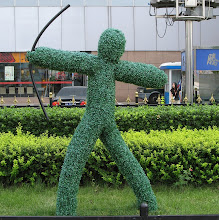
Multiculture society is a society that has people with different culture backgrounds. I was raised up in a single culture society, and never thought that people could be totally different, collectively, until I lived in Singapore for five months as an exchange student.
My most important discovery is that Singaporean students regard extracurricular activities (EA) as important as their studies. They could spend a whole summer preparing for the exhibition of the Flag Day, a university-wide competition among residential halls in the beginning of fall semester, and the committee member could have a meeting for ten hours coordinating this event. They put as much time in EA as in their studies or even more in school time also. Various activities, in block, in hall, in faculty and in university, requires commitment of time. They have a complicated points system to evaluate a student's performance in a hall in order to determine whether he or she could stay for the next year. And to stay in a hall for all four years is a honor, comparable to a faculty dean's list. The people, students as well as teachers, in my home university never think like that. Back home, study is always the first priority.
When I began to think about why the practice is so different in Singapore from that in my home university, the first answer seems to be that the systems are different. But then I realized it is people who make the system. So maybe it is the difference of people's attitudes towards EA and studies in a society leads to the different systems and, in turn, different practice. So further comes the question: how come the different attitudes? History, culture, or level of development? I am not sure.
As I am thinking about these questions, I am trying to find the reasons for my own practices, not only in my time arrangement, but also in other aspects of life, such as the way I talk, diet, and pace of life. It turns out that some of them are just imitation of people around me: I did as people around me all did. This finding strikes me: in a sense, I had been doing things unconsciously for about twenty years.
Luckily, now I begins to think about the reason for my daily practice, and if there could be any alternative. I began to be aware of many things which I had unconsciously ignored. In a word, I began to observe myself. And that is interesting. I found that when my pride is hurt, I might argue; I found I like to get things done as soon as I receive them, and if not, I began to worry. There is so much I learn just by pay attention to what I do and how I feel, and there are so many things that I realize I can improve by learning how bad I had done.
Updated 15 June 2007
Image credit: www.windows.ucar.edu

1 comment:
Hey, man! Great to hear from you!
Post a Comment